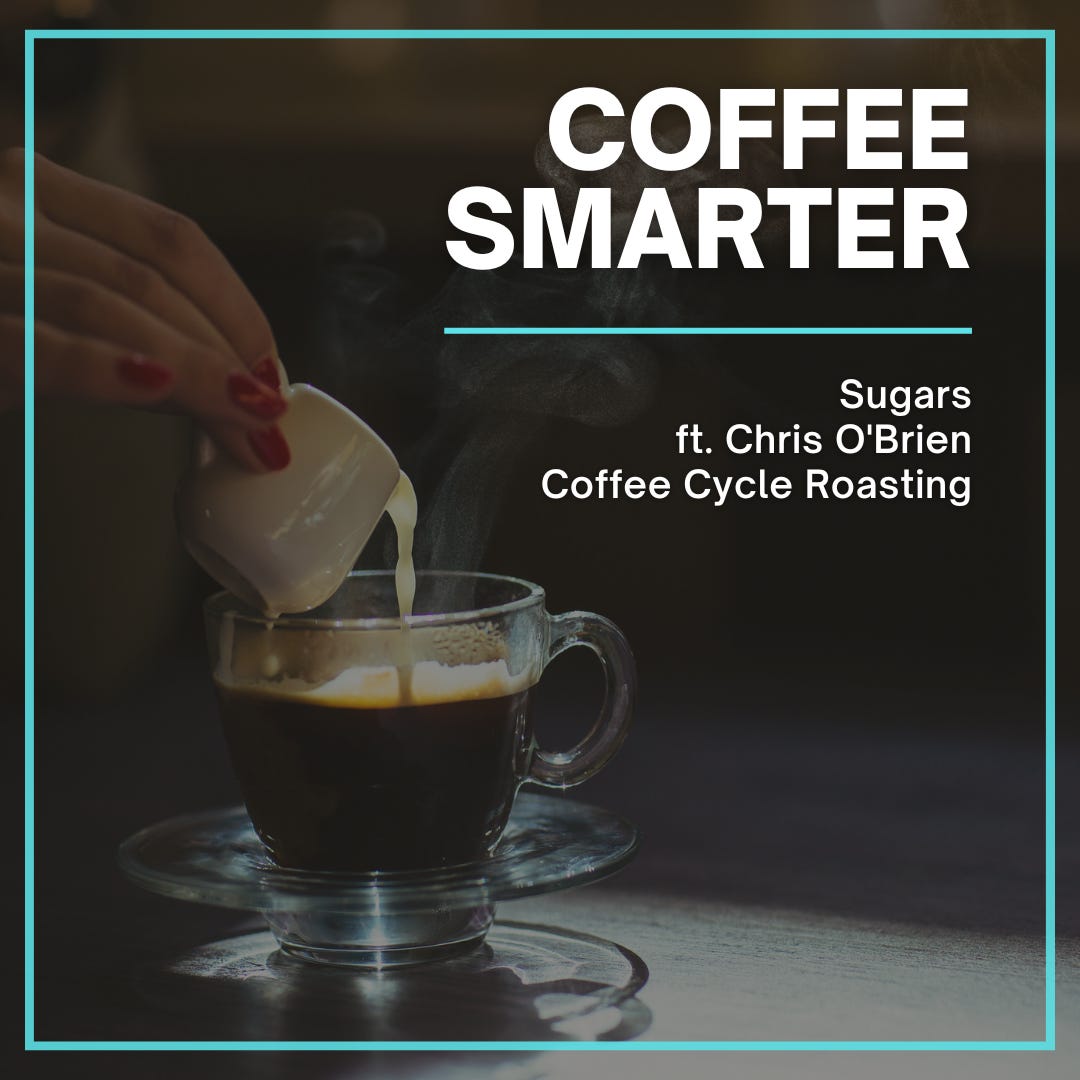S6:EP12
Guest: Chris O’Brien, Coffee Cycle Roasting
Role: Founder & Head Roaster
From: Pacific Beach, San Diego, CA
Instagram: @coffeecycleroasting
Website: www.coffeecycleroasting.com
I started this podcast episode by asking Chris a question about his cafe’s 5th Anniversary direct trade coffee releases expecting a quick, “They’ll great! You’ll love them!” sort of answer before we moved on to the Coffee Smarter questions of the day. That was a mistake. I know from years of experience as his colleague and friend that direct trade, fair treatment, and pay for coffee farmers is a passion for Chris.
I can confirm the roasting of the direct trade coffees went well. I drank the Honduras Gesha from Juan Urquia Farm Saturday morning and ate a cupcake for good measure. Juan Urquias and his business partner Liliana Cardona visited Coffee Cycle earlier this year.

After a coffee sampling and some back and forth between the farm and the cafe, Chris purchased several bags of coffee to roast with more anticipated in the future. Juan sent the Gesha as a special gift to honor their new partnership.
You know that game Six Degrees of Separation? With my morning coffee yesterday, I only needed two to trace coffee back to the source—me to Chris and Chris to Juan. That’s a pretty cool feeling of connectedness. It’s available to us anytime we buy an ethically sourced cup of coffee, buy groceries at the Farmer’s Market, pick up beer at the brewery, or even make an effort to buy books at the indie book shop.
I’m not the best person to be advocating for connectedness. I’ve often gone out of my way to disconnect! Most of my careers have involved a lot of direct engagement with strangers. At some point, I began to crave the silence that comes from sitting home alone on the couch with a book and a cup of coffee. I have, at times, claimed to be an introvert.
And yet, I find myself seeking out connections through this podcast, through my cup of coffee, and getting excited to engage with every new show guest, listener, or stranger with a story to tell. The two sides of my personality are in a never-ending dual in which they both seem to think they’ve won and both lost.
They’re not wrong.
FROM THE SHOW
The price of milk to both producers and consumers has gone over time. Coffee farmers haven’t seen the same sort of consistency. In a fun sort of time waster, TasteOfHome.com created a list enabling readers to see the cost of milk from roughly the time period they were born. See the list here.
Coincidentally, Yahoo! Finance collected the same info for a cup of coffee (from other sources. In the year I was born, an average cup of coffee cost $1.04. Generally, the price has raised by a few pennies (adjusted for inflation) each year since 1940. Find the price of a cup of coffee the year you were born here.
AN OVERSIMPLIFICATION OF THE COMPOUNDS IN COFFEE
Acids
Salts
Caffeine
Sugars
Sugars, salts, and acids have the most easily identifiable flavors. Adding sugars in the form of sugar, cream, and syrup will change the flavor of your coffee. Add too much, and you risk masking the natural sweetness of the coffee and may diminish the other flavor notes. That said, the best coffee to drink is the coffee you enjoy. If adding a bit of milk or cream makes coffee more enjoyable for you, then go for it!
Pro-tip #1: If you’re trying to wean back on the additives to your coffee, cut the sugar before the cream. Coffee already has naturally occurring sugars that add sweetness. Ask your barista for advice on which coffees have more sweetness than others.
Pro-tip #2: Milk isn’t all bad. If coffee bums out your tummy, the milk can help balance some of the acidity of the coffee.
Pro-tip #3: An easy way to reduce the additives in your coffee is to experiment with traditional espresso drinks. Create a ladder of drinks to try reducing the milk as you go—latte, cappuccino, macchiato, cortado, espresso.
ANAEROBIC PROCESSED COFFEE
Chris mentioned anaerobic processing during the podcast, and I wanted to clarify his meaning. Tradition coffee processing (washed, natural) is primarily done in the open air. The processing of the coffee leads to fermentation of the sugar found in the coffee cherry.
Anaerobic processing is different because the coffee beans are pulled from cherries and tossed into a big stainless steel tank. The mucilage left over (coffee cherry gunk) is collected and spread over the coffee beans. Some producers will even add flavor compounds during this step. The tank is then sealed. Any oxygen in the tank will be quickly converted to carbon dioxide or pumped out.
The coffee then stews in its own juices for awhile while the sugars are doing their fermentation magic. The process is more controlled than traditional processing methods and easier to replicable. Producers using the anaerobic process can develop intense flavor profiles that may be fruitier and less bitter.
CLICK ON THESE R!WC INDUSTRY PARTNER LINKS
Drink their coffees and whiskeys. Visit their cafes. Support local coffee shops. You won’t be disappointed.
Zumbar Coffee & Tea • First Light Coffee Whiskey • Steady State Roasting • CAFÉ LaTERRE • Mostra Coffee • Coffee Cycle • Camp Coffee Company • Ignite Coffee Company • Ascend Coffee Roasters • Marea Coffee • Cape Horn Coffee Roasters
Get 15% off First Light Whiskey at Barbank.com with DISCOUNT CODE: RWC
Thank you for reading. Roast! West Coast grows through word of mouth. Please consider sharing this post with someone who might appreciate it. Follow @RoastWestCoast on Instagram.













Share this post